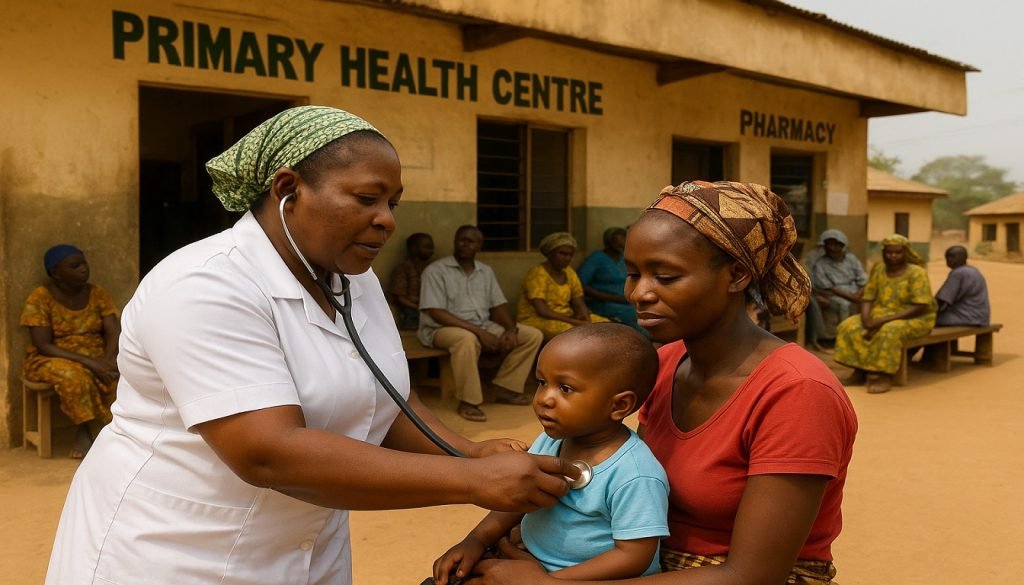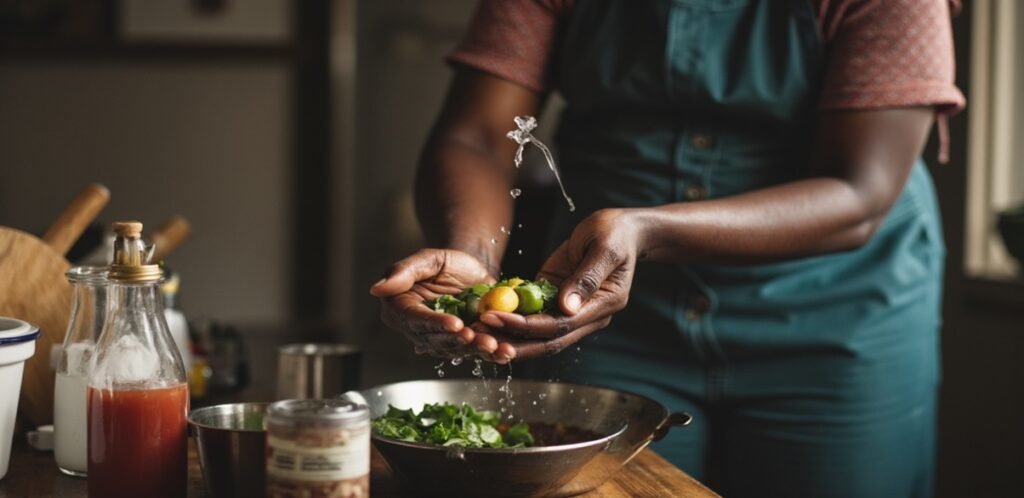The rainy season in Nigeria, which typically spans from April to October, brings relief from the heat, but it also increases the spread of deadly water- and vector-borne diseases. Flooded roads, stagnant water, and poor sanitation create perfect conditions for rainy season diseases in Nigeria, such as malaria, typhoid fever, and cholera.
The numbers are alarming:
- Nigeria accounts for 27% of global malaria cases, according to the World Health Organization (WHO).
- Cholera outbreaks killed over 1,000 Nigerians in 2023 alone, reports the Nigeria Centre for Disease Control (NCDC). Currently, it is ravaging some states, especially in the northern parts of the country.
- Typhoid fever affects an estimated 7 million Nigerians annually (NCBI).
This article dives into practical tips to prevent these rainy season diseases in Nigeria, backed by expert advice and global research findings.
As Dr. Adaora Okechukwu, a Nigerian public health expert, says, “Preventing waterborne and vector-borne diseases during the rainy season requires community action and personal vigilance.”
Rainy Season Diseases in Nigeria: Malaria Prevention Tips

Of the most common rainy season diseases in Nigeria, malaria remains the number one. Stagnant water in gutters and potholes serves as breeding grounds for Anopheles mosquitoes, which transmit the deadly Plasmodium parasites through bites and can be deadly if untreated.
“Sleeping under insecticide-treated nets reduces malaria risk by over 60%,” says Dr. Chikwe Ihekweazu, former Director-General of the NCDC.
The WHO confirms that long-lasting insecticidal nets (LLINs) reduce child malaria deaths by 20% in sub-Saharan Africa (WHO Malaria Fact Sheet).
Practical Malaria Prevention Tips
- Use insecticide-treated bed nets: Sleep under treated nets every night to block mosquito bites. Ensure nets are intact and tucked in properly.
- Apply mosquito repellents: Use products with DEET or picaridin on exposed skin, especially at dusk and dawn when mosquitoes are active.
- Eliminate stagnant water: Clear puddles, open containers, and clogged drains around your home to stop mosquitoes from breeding.
- Consider antimalarial prophylaxis: Consult a doctor about preventive drugs if you live in or travel to high-risk areas.
- Install window screens: Keep mosquitoes out by securing windows with tight-fitting screens.
- Seek Early Testing: Visit a health center for malaria tests if you have a fever or chills, and avoid self-medication.
- Consider Natural Remedies: Natural home remedies for malaria help alleviate symptoms.
Dr. William Brieger, a malaria expert, emphasizes, “Eliminating breeding sites is as crucial as personal protection to prevent malaria in Nigeria.” Join community fumigation efforts to reduce mosquito populations. These steps can significantly lower your risk of malaria during the rainy season.
Pro Tip
The Nigerian Malaria Elimination Program (NMEP) distributes free LLINs nationwide; do well to ask at your nearest primary health center.
Rainy Season Diseases in Nigeria: Typhoid Prevention Tips

Typhoid fever, caused by Salmonella Typhi, spreads through contaminated water and food. Heavy rains often flood drainage systems, mixing sewage with drinking water sources.
A 2022 study in The Lancet Global Health showed that typhoid vaccination campaigns in Nigeria cut cases by 65% in targeted areas (https://www.thelancet.com/).
“Most typhoid infections in Nigeria come from unsafe water and street food during rainy months,” explains Prof. Akin Osibogun from the University of Lagos.
- Handwashing with soap reduces typhoid risk by 30% (CDC).
- Boiling water or using purification tablets reduces infection risk by over 70% (NCBI). Read also: Lifeline of Hydration
Practical Typhoid Prevention Tips
- Boil or treat drinking water: Boil water for at least one hour or use chlorine tablets to kill typhoid bacteria.
- Wash Fruits and Vegetables: Use saltwater or vinegar to clean produce thoroughly.
- Wash hands thoroughly: Use soap and clean water before eating or preparing food to avoid contamination.
- Avoid risky foods: Skip street food or raw vegetables unless washed with treated water. Cook food thoroughly.
- Get vaccinated: The CDC recommends typhoid vaccines for those in high-risk areas (https://www.cdc.gov/). Check with your local clinic.
- Store food safely: Keep food in sealed containers to protect it from flies or floodwater.
Rainy Season Diseases in Nigeria: Cholera Prevention Tips
Cholera, caused by Vibrio cholerae, spreads rapidly through contaminated water and food. During floods, open defecation and poor waste disposal worsen outbreaks.
“Cholera thrives in flooded areas where sanitation collapses,” warns Dr. Ifedayo Adetifa, current NCDC Director-General.
- WHO notes that safe water and oral rehydration salts prevent 90% of severe cholera cases (WHO Cholera Fact Sheet).
- The 2023 Adamawa and Borno cholera outbreaks were linked to contaminated boreholes (NCDC).
Practical Cholera Prevention Tips

- Drink Only Safe Water: Boil or use chlorine tablets to disinfect water.
- Maintain Proper Hand Hygiene: Wash hands with soap after using toilets and before eating.
- Eat Safe Food: Avoid uncooked vegetables, and ensure food is thoroughly cooked.
- Report Outbreaks Quickly: Contact local health authorities if you notice sudden diarrhea outbreaks in your community.
- Use oral rehydration salts (ORS): At the first sign of diarrhea, use ORS to prevent dehydration while seeking medical help.
- Support clean water initiatives: Advocate for community efforts to maintain safe water sources and proper waste disposal.
Community and Policy Support for Disease Prevention
Individual efforts to prevent malaria, typhoid, and cholera are vital, but community and government action amplify impact. Nigeria’s National Malaria Elimination Programme distributes bed nets and promotes fumigation (https://nme.gov.ng/).
Cholera task forces tackle outbreaks, while GAVI funds typhoid vaccination campaigns (https://www.gavi.org/). Join local cleanup drives to remove stagnant water and improve sanitation. Advocate for better water infrastructure and public health campaigns.
Dr. Matshidiso Moeti, WHO Africa Regional Director, states, “Empowering communities with knowledge and resources is key to preventing seasonal diseases in Nigeria.” Collective action strengthens prevention efforts and saves lives.
Frequently Asked Questions
- How can I prevent malaria if I can’t afford bed nets?
Visit local health centers or NGOs, which often distribute free nets during malaria campaigns. - Is the typhoid vaccine safe for children?
Yes, the CDC approves typhoid vaccines for children over 6 months in high-risk areas (https://www.cdc.gov/). - What should I do if I suspect cholera in my community?
Report to health authorities immediately and use ORS while seeking medical care. - Can I prevent these diseases without vaccines?
Yes, hygiene, clean water, and mosquito control significantly reduce risks. - Are vaccines available for these diseases?
- Yes, typhoid and cholera vaccines are available. Malaria vaccines are mainly for children and not yet widely accessible in Nigeria.
Final Thoughts
Malaria, typhoid, and cholera are preventable rainy season diseases in Nigeria. By practicing good hygiene, drinking safe water, and using mosquito nets, you can protect yourself and your family.
Visit your nearest health center for free mosquito nets, water purification tablets, and vaccines.
Stay safe, share this article, and help others stay healthy this rainy season!
This post is only for educational purposes; therefore, consult your doctor before making any medical decisions.
Kindly subscribe, like, and share this post.





Pingback: Top 20 Common Allergic Disorders in Nigeria
Pingback: Top 20 Causes of Convulsions in Nigeria
Pingback: Lassa Fever, Malaria and Typhoid: Spot Differences